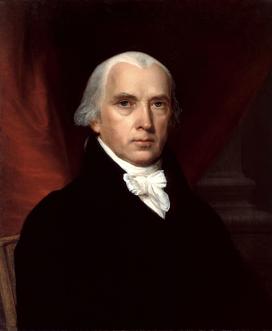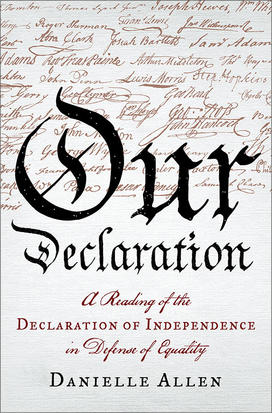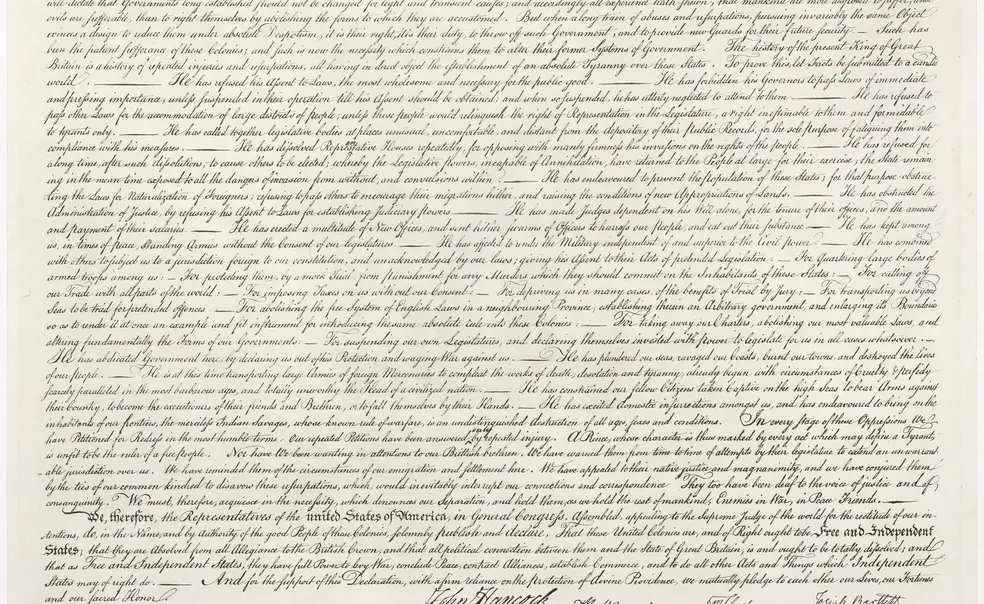This is the first time of my introducing any political subject into the pulpit. At this season, however… I willingly embrace the opportunity of declaring my opinion… that the cause in which America is now in arms, is the cause of justice, of liberty, and of human nature.
— Rev. Dr. John Witherspoon, May 1776
If you wish to get course credit for reading this column, please sign the pledge:
I pledge my honor that I have not violated the honor code during this examination.
The exam consists of one question. If you are a citizen of the United States, the question is:
Identify and discuss the following quotation from the Declaration of Independence:
He [George III] has waged cruel war against human nature itself, violating it’s [sic] most sacred rights of life & liberty in the persons of a distant people who never offended him, captivating & carrying them into slavery in another hemisphere, or to incur miserable death in their transportation thither.
If you didn’t say, “Wait a second, Crafty Columnist, that’s not in the Declaration of Independence. A curse on you and all who sail in you,” then you are required to read Our Declaration by Danielle Allen ’93, the tour de force serving as this fall’s Freshman Pre-read. If you, the Able Historian, did realize that the declaration-drafting Committee of Five in the Second Continental Congress presented the anti-slavery clause and then had it unceremoniously excised by the body at large prior to approval on July 2, 1776, then you still should consider the Pre-read as a test of your reasoning skills and a testament to the power of the English language.
While the momentous detail packed into the treatise’s 282 pages defies adequate description in this limited space, I should emphasize it is far beyond being a primer on semantics, and extends to sociological and political issues large and small, all the way from how difficult it is for a group (in this case, Congress) to jointly construct any meaningful statement of abstract principles, to various tales of how complex the invention of democratic practices could become. I had, as an example, heard much before about the striking of the Declaration’s slavery clause, thanks to the great Broadway musical 1776 (sort of a baby boomers’ Hamilton from 1970). The show also includes a pointed snippet of good ol’ Rev. Dr. John Witherspoon, beacon of the Enlightenment, president of Princeton, and the only clergyman in Congress, adding reference to Divine Providence to a draft in which Jefferson previously had ignored the Almighty. But I wasn’t aware that, following his parenting of the U.S. Constitution in 1787, the Bill of Rights, and then the Federalist Papers, Witherspoon’s protege James Madison 1771 ghostwrote Washington’s first inaugural address, then as a Representative was asked by Congress to write the body’s response to the speech, and then wrote Washington’s response to the response (“… produces emotions which I know not how to express” – ya gotta love it). Thanks to Allen (and her father, who told her the early history of the country consisted of James Madison talking to himself), there’s a whole new musical waiting to happen.

Meanwhile, Our Declaration essentially deconstructs every word of the final document, even to the point of evaluating the punctuation variances in the multiple printed versions authorized by the Congress. Amazingly, they turn out to be material: Are there three truths we hold to be self-evident, or five? (We’ll make that your extra credit question.)
Is there actually a contemporary point to this exercise, or are we just telling (admittedly fascinating) stories of days gone by, and the challenges of calligraphy? Hardly. Allen is (God bless her) obviously a process nut like many of us, with a weakness for juicy historical detail and a horror of dangling threads, but that’s a warmup for her, as the subtitle of the book makes abundantly clear: A Reading of the Declaration of Independence in Defense of Equality. “All men are created equal” — with the rich stew of debate surrounding whether that intends to include indigent men, indentured men, women, racial “minorities” (an odd idea in a philosophical statement), atheists, children, whoever — after all precedes even “life, liberty and the pursuit of happiness” as the crucial argument about the righteousness of separation from King George unfolds, and if called into question seemingly negates even worrying about the remainder of the folderol that follows. Allen not only emphasizes its primacy, but structurally demonstrates that practical political equality requires group compromises and regulation, as well as the disciplined and equitable administration of justice by duly created governing entities. In other words, equality requires structure, which differentiates it from liberty; in fact, there are times when absolute liberty might seem at variance with equality, although in fact both are deeply intertwined and codependent.
Here we run headlong into today’s headlines, as Allen states a forceful case for the primacy of egalitarianism, and the inadequacy of libertarianism alone to provide it. The cause of minimal government — as distinct from the cause of effective government, which may in its course appropriately include efficiency and span-of-control questions — is not welcome at all in this construct, and it is powerfully argued that the reasons are explicitly laid out in the Declaration of Independence. Given how intimately we know the Second Continental Congress, their world and their procedures by the end of this study, it is a daunting conclusion on which to build a serious counterargument.
Which answers in part, I suspect, the obvious question: Why impose this on a few hundred innocent, brilliant new freshmen? It’s unlikely to be the current shameful national election campaign, although you can essentially read opprobrium for it on every page of the book, and in every word of the Declaration. It may have something to do with last year’s student demonstrations and some of the myopic self-centeredness that seemed on display on both sides of some ensuing arguments. My broader suspicion is that some of the human character traits brought out on Twitter and Instagram, lifeblood to many 18-year-olds (the Pre-read target audience) and others today, are odious enough to prompt rethinking tantrum-laden freedom of expression, however sacred it might be, and this book is a brusque counterargument for intelligent people.

It’s likely not coincidental that we’re now celebrating (I am, anyway; it hardly seems a big deal to most people as opposed to, say, photos of candidates’ spouses) the 240th anniversary of the Declaration of Independence, and perhaps more important, the people who laid down their lives, their fortunes, and their sacred honor for it. Speaking of death, come next December and January it will be 240 years since the battles of Trenton and Princeton, which as we’ll see in a later column were almost instantly regarded as some of the most brilliant in recorded history. But that was only because the Declaration was already in circulation, legitimizing the United States as an entity worthy of global regard. Its daunting audience, as Allen points out in detail, was the entire world, including the French navy, the Canadian woodsmen, and the soldiers without shoes fighting for George Washington. Worth reading about today, whether you’re American, British, or Malaysian.
And so, back to the exam:
If you are not a citizen of the United States, the test question is:
Identify and discuss:
We hold these truths to be self-evident, that all men are created equal, that they are endowed by their Creator with certain unalienable rights, that among these are Life, Liberty, and the Pursuit of Happiness…
I’m sure nobody’s surprised the foreign examinees did better on their exam than the Americans. But for a moment, with profound thanks to Allen, let’s consider for ourselves why that’s true; what the United States — whose foundations and creation were so influenced by Princetonians — means now in the world at large, and ought to mean to each of us.
And then consider, this was first laid out in 1,337 words — precisely the length of this column.
Dei sub numine viget.
Gregg Lange ’70 is a member of the Princetoniana Committee and the Alumni Council Committee on Reunions, an Alumni Schools Committee volunteer, the memorialist of the Class of 1970, and a trustee of WPRB radio. He is a recipient of the Alumni Council’s Award for Service to Princeton.












No responses yet